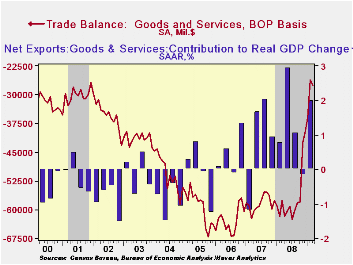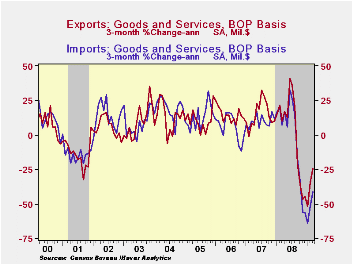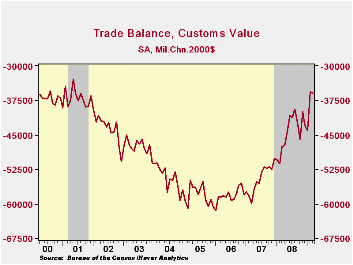 Global| May 12 2009
Global| May 12 2009U.S. Trade Deficit Remains Stableand Near Its Lowest Since 1999
by:Tom Moeller
|in:Economy in Brief
Summary
Though higher oil prices raised the cost of petroleum imports during March, the lift just slightly deepened the U.S. foreign trade deficit and it remained near the lowest level since 1999. The deficit of $27.6B deepened from the [...]

Though higher oil prices raised the cost of petroleum imports during March, the lift just slightly deepened the U.S. foreign trade deficit and it remained near the lowest level since 1999. The deficit of $27.6B deepened from the little revised February level of $26.1B. Imports remained down by one-quarter from last March due to the U.S. recession. Exports fell a lesser 17.4% y/y. Consensus expectations had been for a March deficit of $29.1B.
Adjusted for price inflation the trade deficit in goods also was roughly stable at $35.9B, the lowest since the 2001 recession. It was down from $47.6B last March.
A modest rise in crude oil costs to an average of $41.36 per
barrel still left them more than 50% lower than last March. Petroleum
imports retraced all of the February decline, rising 17.8%, while the
12.4% m/m rise in volume terms left real oil imports up just modestly
from last year.
Measured in chained-2000 dollars nonoil imports fell a slight 0.9% (-22.0% y/y). Overall real non-auto consumer goods imports fell 12.5% y/y to their lowest level since early-2005. Imports of automotive vehicles & parts were down 48.3% y/y, while non-auto capital goods imports fell 22.8% y/y to their lowest since 2004.
Services imports fell another 1.0%, about as they did in February (-7.0% y/y), and are down for the seventh consecutive month. The decline reflected yet another decline in travel imports (-9.7% y/y) even as passenger fares dropped by 14.5% versus March of 2008.
Recessions abroad caused real exports of goods to reverse most of the February increase, falling 1.8%. The decline left them down 14.2% y/y, nearly the lowest level since late-2005. The chained dollar value of non-auto consumer goods exports reversed just some of the February increase with a 3.7% decline (-3.9% y/y). Capital goods exports were down a sharper 4.9% (-17.7% y/y) while real exports of automobiles & parts fell 4.1% (-39.3% y/y).
Nominal exports of services fell hard again. The 1.2% m/m
decline pulled them down by 6.8% y/y. Travel exports fell 15.5% y/y as
fewer foreign citizens came to the U.S. even as passenger fares fell
19.6%.
The U.S. trade deficit in goods with China deepened just slightly to $15.6B but remained near the lowest level since early-2006. Imports fell 5.5% y/y but U.S. exports fell a harder 12.3%. The trade deficit with Japan also deepened slightly to $2.6B but it remained near its shallowest since 1984. The U.S. recession drove down imports from Japan by roughly one-half from one year ago while exports fell by nearly one quarter.
The international trade data can be found in Haver's USECON database. Detailed figures are available in the USINT database.
The Supervisory Capital Assessment Program is yesterday's speech by Fed Chairman Ben S. Bernanke and it can be found here.
The Global Recession from the Federal Reserve Bank of St. Louis is available here.
| Foreign Trade | March | February | Y/Y | 2008 | 2007 | 2006 |
|---|---|---|---|---|---|---|
| U.S. Trade Deficit | $27.6B | $26.1B | $57.4B (03/08) | $681.1 | $700.3 | $753.3 |
| Exports - Goods & Services | -2.4% | 1.5% | -17.4% | 11.5% | 13.0% | 13.5% |
| Imports - Goods & Services | -1.0% | -5.1% | -27.0% | 7.3 | 6.1% | 10.8% |
| Petroleum | 3.1% | -8.4% | -51.1% | 37.0% | 9.4% | 20.1% |
| Nonpetroleum Goods | -1.7% | -5.4% | -25.0% | 1.3% | 4.8% | 9.1% |
Tom Moeller
AuthorMore in Author Profile »Prior to joining Haver Analytics in 2000, Mr. Moeller worked as the Economist at Chancellor Capital Management from 1985 to 1999. There, he developed comprehensive economic forecasts and interpreted economic data for equity and fixed income portfolio managers. Also at Chancellor, Mr. Moeller worked as an equity analyst and was responsible for researching and rating companies in the economically sensitive automobile and housing industries for investment in Chancellor’s equity portfolio. Prior to joining Chancellor, Mr. Moeller was an Economist at Citibank from 1979 to 1984. He also analyzed pricing behavior in the metals industry for the Council on Wage and Price Stability in Washington, D.C. In 1999, Mr. Moeller received the award for most accurate forecast from the Forecasters' Club of New York. From 1990 to 1992 he was President of the New York Association for Business Economists. Mr. Moeller earned an M.B.A. in Finance from Fordham University, where he graduated in 1987. He holds a Bachelor of Arts in Economics from George Washington University.






